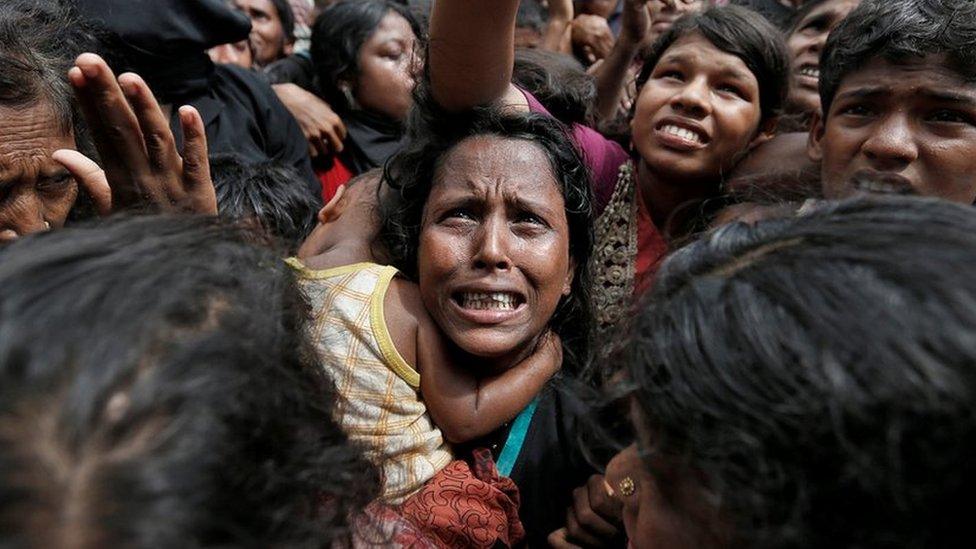Myanmar coup: What now for Aung San Suu Kyi?
- Published
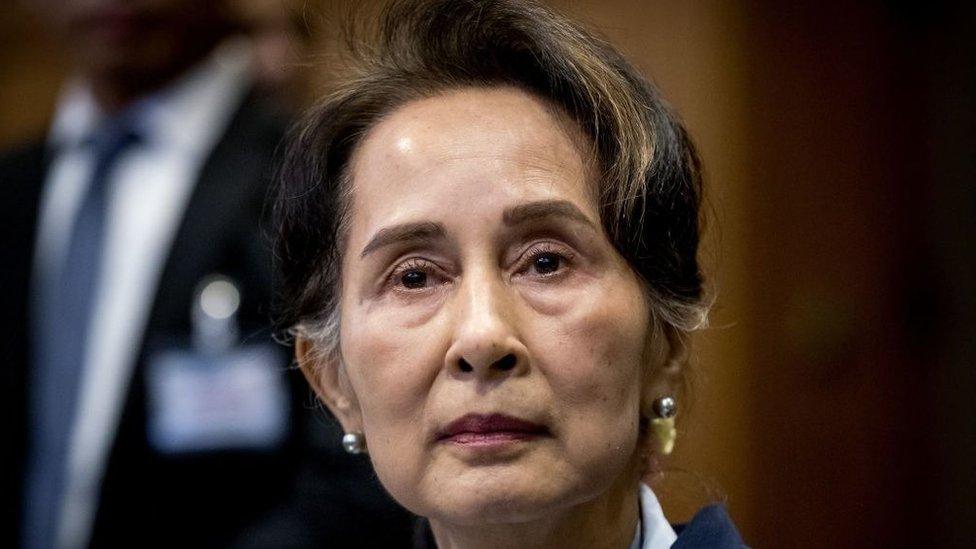
Aung San Suu Kyi remains hugely popular in Myanmar, but has lost favour in the West
How would you describe Myanmar's military leadership?
Few people, speaking freely, would reach for labels of affection. But in 2018, a year after the world watched the horrific expulsion and mass murder of the Rohingya people - an alleged genocide - Aung San Suu Kyi opted for the phrase "rather sweet" to describe the generals in her cabinet.
Three years on, as she sits under house arrest once again - the victim of the swiftest of coups - her decision to defend the army, either for personal, political or patriotic reasons, looks a very bad one.
Her supporters will tell you she was in an impossible position and that taking a tougher stance would have hastened her incarceration. Her critics insist she still could have shown at least a flicker of compassion for the persecuted Muslim minority.
Either way, her prospects and those of a democratic Myanmar look bleak.
While her international halo may have slipped and shattered, Aung San Suu Kyi is still adored by tens of millions in Myanmar. This popularity cannot be overstated. The thumping general election victory for her National League for Democracy saw them win more than 80% of the vote.
If you wander the crumbling streets of downtown Yangon - with the canopy of tangled power wires overhead and the occasional scurry of cat-sized rats at your feet - and pop your head into any doorway, there's one face you're more than likely to meet. Whether it's on a poster, a painting or a calendar, Mother Suu's image looks backs at you.
These are the same streets which now after dark reverberate with the clanging of pots in support of their democratically elected - and now summarily detained - leader.
"We normally make this noise to drive out evil spirits," explained Ma Khin in a description to her social media post. "Now we want to drive the military out so that Aung San Suu Kyi can be free."
People in Yangon banged pots and pans to protest against the military coup
As well as the din of the pans, a much more soothing sound fills the warm night air. The songs of the 1988 Uprising - that upswell of democratic fervour that propelled a young Suu Kyi into the domestic and international limelight, and precipitated her first of many periods under house arrest.
Wai Wai Nu, a Rohingya human rights activist, captioned her own uploaded street video with the words "very painful to see" as she recalled singing the revolutionary verses in jail with fellow political prisoners.
In the footage, I was struck by an image which epitomises a defining irony in the violent, twisted and tragically repetitive history of Myanmar. Illuminated by the light of smartphones held aloft, there was a portrait of Aung San Suu Kyi's father - General Aung San: the still-revered leader, assassinated in his prime in 1947 before he could guide Burma into independence from the British.
He was also the founder of the modern Burmese army, also known as the Tatmadaw: the very institution now depriving his daughter of her liberty and his country of their leader. Again.
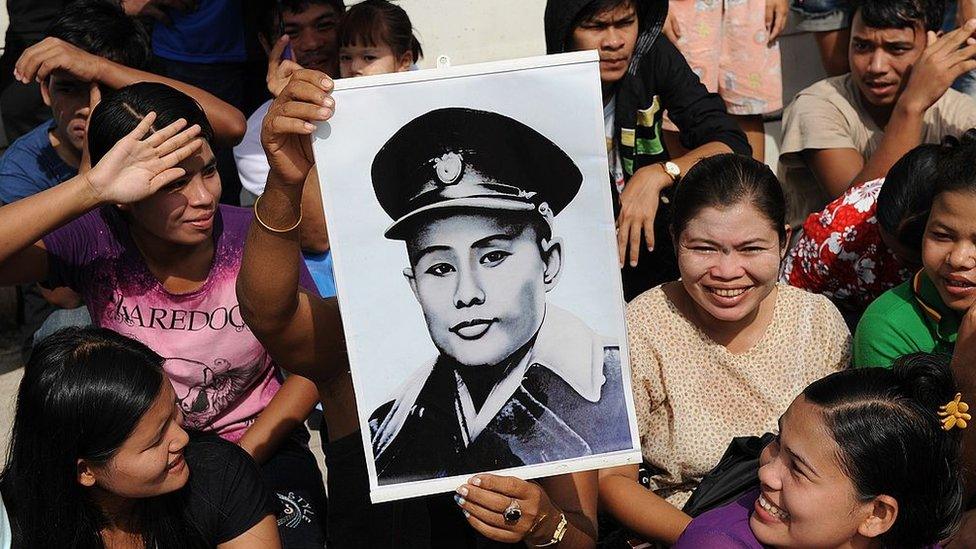
General Aung San helped secure Myanmar's independence from the British Empire
The same mobile phones that keep the memory of her father burning brightly could yet lead Aung San Suu Kyi from the darkness.
For if previous struggles for freedom - in 1988 and 2007 (the Saffron Revolution) - were played out on the streets, this one will be powered online. On Facebook to be precise, the platform that millions of Burmese use above all others to send and receive their news and views.
This, of course, if the army doesn't persist in blocking access to the site and app. Because the military, whose senior command are now banned from Facebook after using it to such devastating effect in the last decade to whip up nationalist sentiment, spread hate speech and fake news, know its power. And fear it, you'd imagine.
The Tatmadaw's capacity for murderous brutality - in slaying their own people, students and monks seeking freedom - cannot be beaten. But they are pulverised in any fight for Burmese hearts and minds.
The problem for Aung San Suu Kyi and her supporters is harnessing this digital power. Many were taken aback by the directness of her purported plea in a letter to "protest against the coup". Some feared it may be a military trap, to lure protestors to their arrest - or worse.
Flooding the street in the name of "The Lady" may provide high quality images and a powerful message for global social media and TV news. But the grainy film of 1988 is a chilling reminder that these very roads were bathed in blood when soldiers cut down a previous generation who were asking for freedom.
There's nothing new that I can see that suggests the Tatmadaw would stop short of carrying out a live-streamed massacre in the major cities of Myanmar.
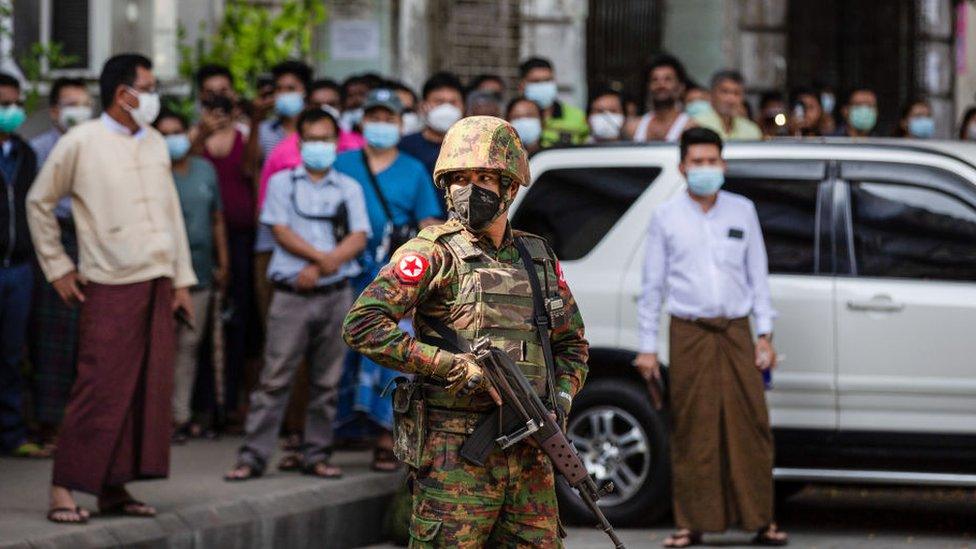
The Tatmadaw is one of the largest militaries in the region
There is another paradox in the country's latest traumatic chapter.
Aung San Suu Kyi's chances of finding freedom, and possibly even a return to power, are dependent on the action or inaction of the "international community". A simplistic label for a disparate grouping of friend and foe, East and West.
As far as the privileged society that is the West is concerned, Suu Kyi was Life-President - a beacon of all the values elected leaders will tell you they hold dear. But it's a club she turned her back on following the avalanche of criticism she received for refusing to support or protect the Rohingya.
She was seemingly unmoved as titles, awards, prizes were rescinded by horrified universities and charities.
One illustration of the souring relationship was with my employer. The BBC World Service was a loyal companion for her during her more than 15 years of house arrest. But following the atrocities of 2017 in Rakhine State, it all changed. Like for other Western media outlets, my frequent letters of request for an interview or audience were not returned. There was apparently no need to engage those who, in her view, could never understand the complexities of her country.
In my two years covering Myanmar, the closest I got to a conversation was at the International Court of Justice in The Hague after she chose to personally defend Myanmar's army from the charge of genocide.
"Will you ever say sorry, Ms Suu Kyi?" I called out as she glided from her executive car into the cold arena where accounts of the worst imaginable crimes are considered. No answer. Not that I was expecting one.
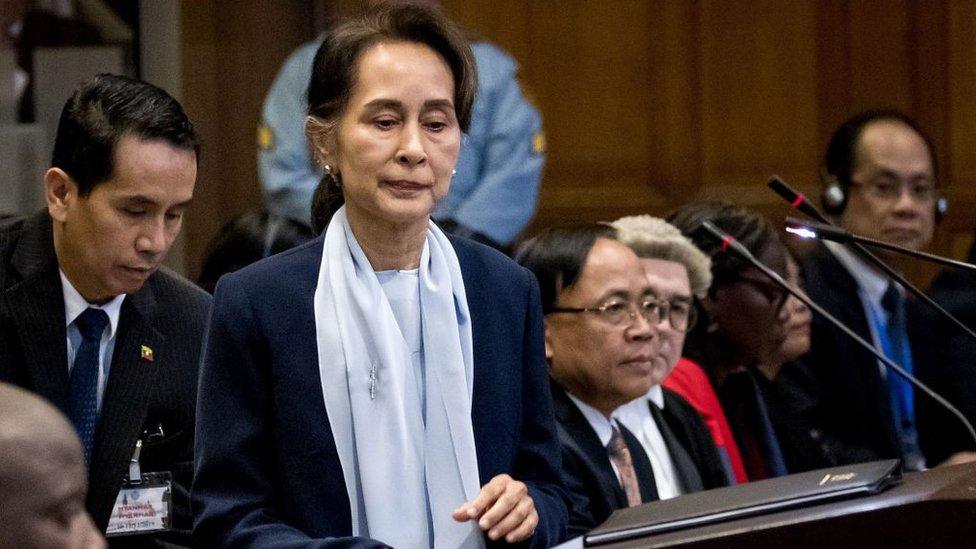
Aung San Suu Kyi defended her nation's military at the International Court of Justice in 2019
Aung San Suu Kyi decided to be the face of the effort to justify the crimes of Myanmar's unaccountable army. Despite the widespread loathing of the military, it boosted her popularity at home and she was praised for protecting the country's honour.
But some now believe she should no longer be the ubiquitous face of the nascent struggle to free the country from newfound military dictatorship.
"The response to this situation should not be seen in narrow terms as 'Helping Aung San Suu Kyi'," Richard Horsey, a Yangon-based political analyst, told me.
"It's about opposing a military coup against a popularly elected government and supporting the vast majority of ordinary Myanmar people and their democratic rights and freedoms."
Others are more blunt.
"When I heard about the coup I thought she had been outsmarted after making a pact with the devil," said Bill Richardson, a former US Ambassador to the UN.
He was a friend of Suu Kyi until the pair fell out in 2018 after he says he implored her, wholly unsuccessfully, to do more to protect the Rohingya.
"I was one of her biggest fans until she got elected," he said.
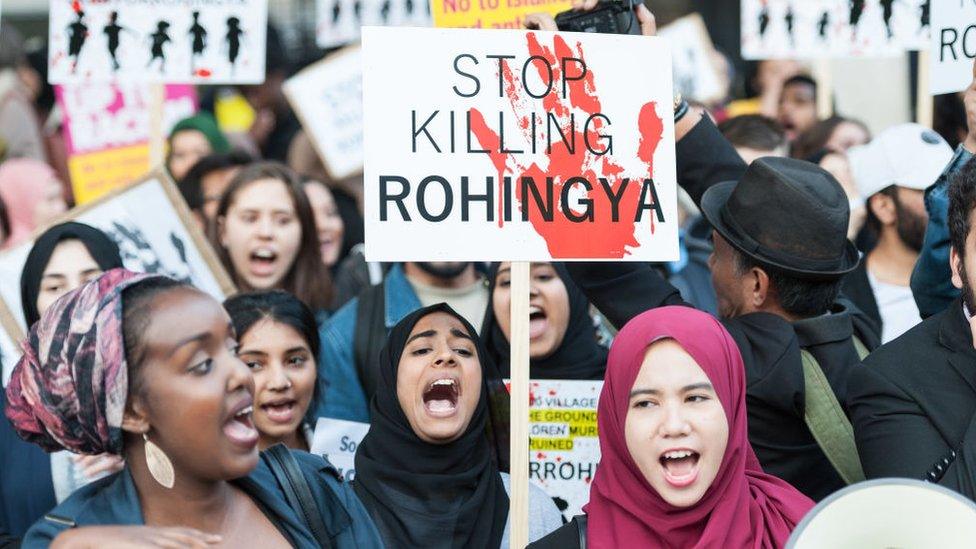
Myanmar's treatment of the Rohingya sparked global outrage
Mr Richardson believes the National League for Democracy finally needs to develop new leaders, particularly women, especially at a time when their democratic mandate has been crushed.
Aung San Suu Kyi faces trumped up charges which could see her jailed, which would bar her from office. The generals claim there will elections at some point once the country emerges from its designated "state of emergency". It's clear they want to puncture the tyres of this electoral juggernaut who would smash every army road block on the road to democracy if the rules of the game were fair.
What will his former friend of 20 years be thinking now as she faces months, if not years under house arrest or worse, I ask Mr Richardson.
"I think she'll feel that she's been betrayed by the military she provided international cover for. Her position is bleak. But I hope they don't take steps to hurt her or silence her permanently."
And if Aung San Suu Kyi is allowed a voice once again, what then?
"If she is able to speak out and acknowledges the crimes against the Rohingya people in a way that the international community would think is credible and honest, it's still not too late. That would rally the world into action against this coup," he said.
"It would be a risk. But she's taken risks before."
Nick Beake is the BBC Brussels correspondent and was the BBC's Myanmar correspondent from 2018-2020.
Related topics
- Published4 February 2021
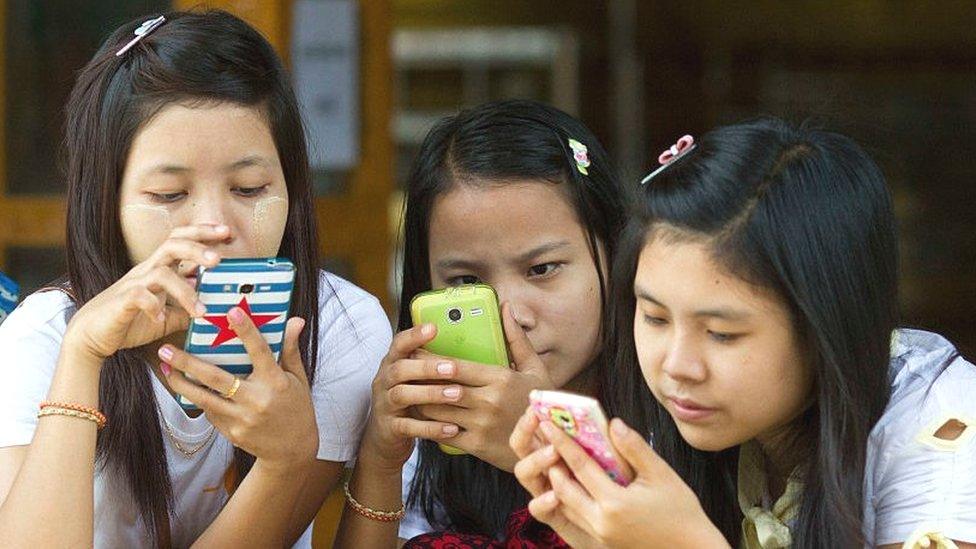
- Published11 December 2019
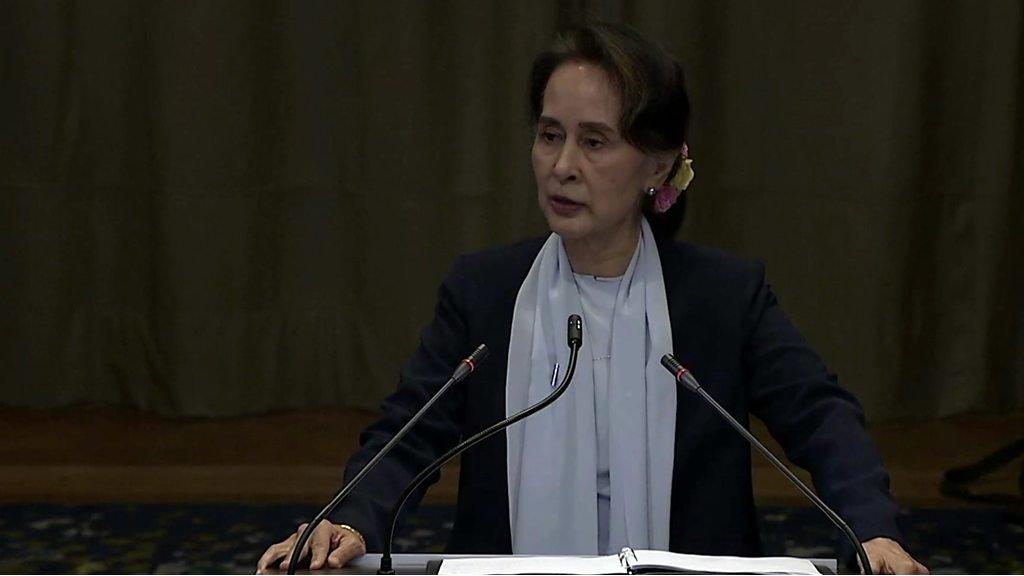
- Published23 January 2020
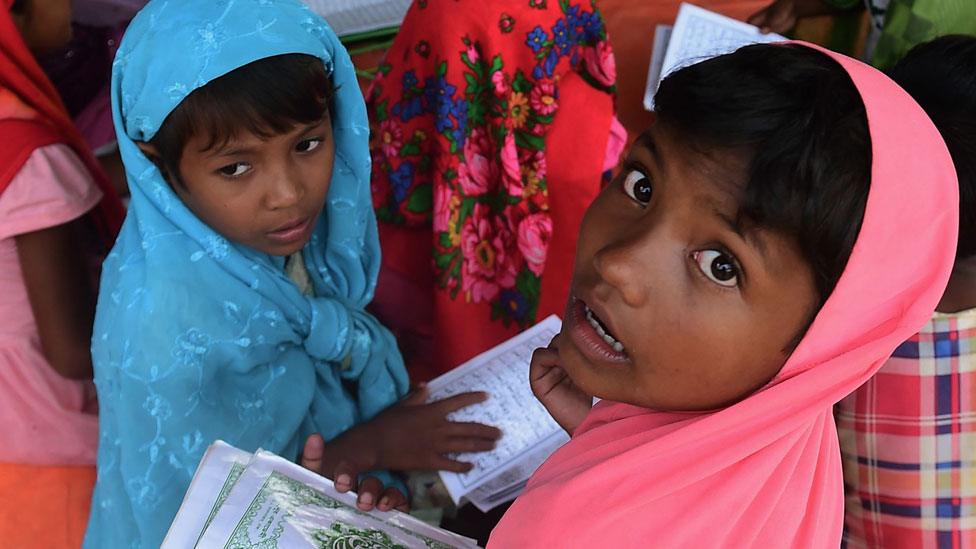
- Published3 September 2018
